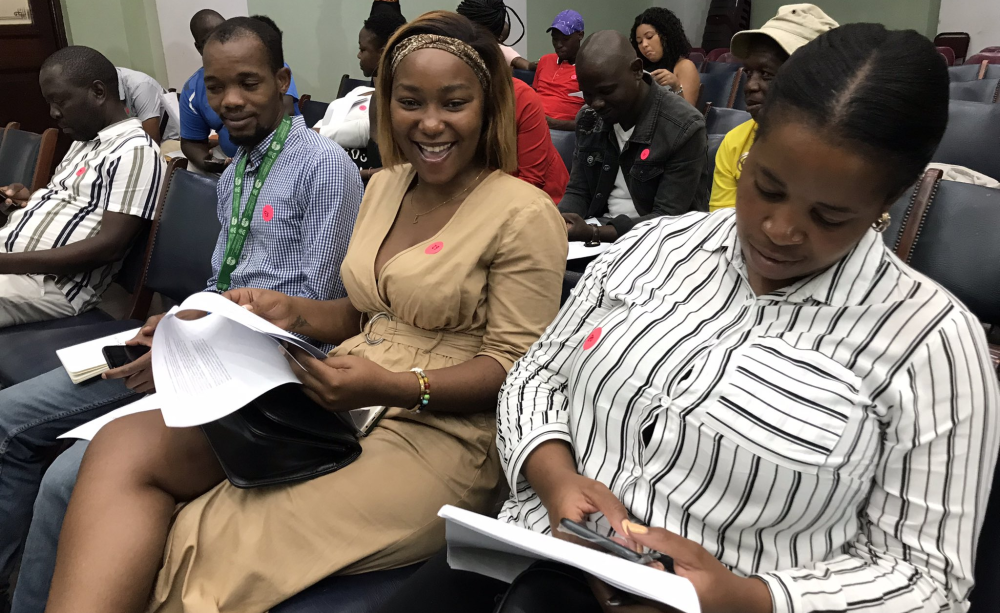When you're on the ground, you are warned not to be too vocal, too active, because you're going to get killed.
Many young South African activists are determined to address issues relating to environmental degradation and climate change despite sometimes daunting challenges.
These efforts often begin at a grassroots level, in the communities they know best. Lindi Shozi’s ever-deepening commitment to the environment provides just one inspiring example.
Lindi was 13 when she first learned about climate change. She was shocked to realise how thoroughly her own community was implicated in the ongoing damage: "I grew up in the rural area of Qin’about, near Port Shepstone on the KwaZuluNatal South coast," the 27-year-old explains. "I was like, Oh, I'm actually contributing to this, because at home, we burn waste."
This article has been published through the Ecologist Writers' Fund. We ask readers for donations to pay some authors £250 for their work. Please make a donation now. You can learn more about the fund, and make an application, on our website.
Contribute
Like many rural areas in South Africa, Aquin’about remains very underdeveloped: "Along with a total lack of piped water, there was no waste management system in place.
"Recycling and re-using were very foreign ideas. When you're done with something, you dig a hole and burn it. That included everything, from disposable nappies to old clothing to broken appliances like fridges."
Lindi’s understanding deepened while she was studying for a batchellor of social science in Geography and Environmental Management at the University of KwaZulu Natal (UKZN).
She recognised that in comparison to the damage caused by the oil industry and wealthier countries generally, the burning of waste in rural South Africa contributes little to global warming.
Still, she felt concerned. "I knew that our waste disposal habits could only contribute to the cycle of heat waves followed by extreme rains and flash floods we experience in our area," says Lindi. "My community needed to change its ways, and I wanted to contribute to that process."
Rituals
Faced with a conservative, patriarchal rural culture, Lindi decided that the best way to obtain results was through an older male intermiedary. She began discussions with her uncle to motivate for the implementation of a waste management system by the tribal authorities.
"Fortunately, my family is open-minded and supportive, so it was very easy to engage with him," she says.
After their discussions, Lindi’s uncle approached the tribal authorities, and the issue of cleaner, greener waste disposal was opened up for discussion. In 2019, the Nkosi gave the go-ahead for a series of interlinked innovations.
Since Quin’about is governed by tribal authorities, waste disposal trucks did not enter the area. "We realised that we needed to do things the other way around, and take the waste out," Lindi explains.
When you're on the ground, you are warned not to be too vocal, too active, because you're going to get killed.
"Recyclables such as fridges and couches were moved to an agreed upon site, from where the local councilor collected them. Also, homeless people were paid to collect cans and plastics and take them to the nearest waste site."
While the negotiations were taking place in 2017 and 2018, Lindi led an initiative to clean up the local environment: "We cleared all the litter near the football pitch and the area around a nearby river," she recalls. "That was important to the community, because in rural areas rivers are used for baptism and other rituals."
Youth-led
After completing her undergraduate degree, Lindi undertook a two-year climate and land rights internship with the Association for Rural Land Rights Advocacy ( AFRA), participating in projects helping local rural communities negotiate different challenges associated with climate change. These included water scarcity to dealing with high winds, thunderstorms and flash flooding.
She was also exposed more fully to land management and environmental policy issues. "For the first time, I realised the importance not only of rights but also of companies’ and government’s responsibilities to adhere to laws and regulations with regard to the environment," she explains.
During her internship, Lindi also contributed to the 2023 Pietermaritzburg hearings for the Climate Change Bill as a member of the Climate Champions for Adaptation Project. during the same period, she was involved in protests about an unsafe landfill site hear Sobantu, supported by the SA Human Rights Commission.
"My passion didn’t end when my contract with AFRA did," she says. Lindi is currently studying for an honours in environmental management.
She is also volunteering for the South African Youth Climate Change Coalition (SAYCCC) as the climate justice coordinator and team leader. This youth-led initiative has links to many other organizations, such as the Presidential Climate Commission, where Lindi is a member of the youth leader caucus.
Dangerous
Lindi believes strongly in the power of team -based work. "When SAYCCC called for volunteers to come on board, I was like, 'Yes, please!' Working as part of a group gives you opportunities where your voice and contributions are taken into account. It’s much more of a challenge when you’re working on your own."
Lindi’s work with SAYCCC is often focused in the area of policy. She gives the example of recent efforts by SAYCCC to hold Ethekwini municipality accountable in terms of infrastructure.
"We asked them to inform us about how we’re adapting to climate change and how the youth are being informed about it. Our experience is that information is not easily accessible. I honestly believe that information is not being thoroughly disseminated to rural areas, to people that do not have smartphones, people who are still very marginalised."
Despite this focus, she emphasises that concentrating entirely on the development of policy has its drawbacks: "It can be really demotivating when I'm seated in a meeting and everyone is inputting, inputting, inputting –but implementation is at a standstill."
Environmental activism can be dangerous. This is true for South Africa, as it is for many other countries.
Purpose
"When you're on the ground, you are warned not to be too vocal, too active, because you're going to get killed," says Lindi, recalling the brutal 2020 murder of Fikile Ntshangase and other suspicious deaths of environmental activists.
Despite these intense challenges, Lindi remains confident that a balance of policy and activism can have impressive results. "My dream is to see policy alive in the physical," she says.
"For example, I’m excited by the efforts to implement a green city policy in the area from Hillcrest to Cato Ridge. Another example is the innovative practice of building using rocks found within the local environment, so that no new materials and chemicals need to be brought in."
Lindi ascribes her positivity to her strong faith. "I start any project or meeting in prayer. I also pray for discernment, to know whether something or someone is a good fit for me. I pray that I'm understood and received well.
"Even if only one or two people receive my message, they will make up a team to carry out this work. When I think about it, I always say that I’m blessed. I know that I'm living my purpose. As much as there is negativity, I'm still inhabiting a good, fruitful space."
This Author
Dr Joanne Bloch is a writer and artist living in Cape Town, South Africa. This article has been published through the Ecologist Writers' Fund. We ask readers for donations to pay some authors £250 for their work. Please make a donation now. You can learn more about the fund, and make an application, on our website.




